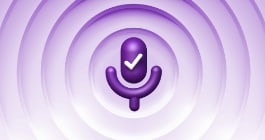Unlock more with the Adobe Podcast Premium plan 
- Video support for MP4, MOV, and more
- Bulk upload files for enhancement
- Adjust strength for a more natural sound
- Enhance up to 4 hours a day, files up to 1 GB
- No download limits on Studio projects
- Download original recordings, speaker-separated
- Customize audiograms and captions with themes
- Upload custom backgrounds for audiograms
- All Premium features for design
Enhance Speech
Studio
Design with Adobe Express Premium
How to write for your voice
From script to sound: writing that reflects your voice.

Last updated: April 5, 2025
Author: Sam Cook, Multimodal content creator
Finding your voice as a podcaster is a crucial first step in producing a show. While many aspects of podcasting require technical skills you may already possess, your unique voice is primarily a soft skill. That doesn’t make it any less important, however. The most successful podcasts are run by individuals who have crafted a distinct and interesting voice.
Because many podcasts are planned ahead of time with written scripts or drafted outlines, your voice is usually a combination of what you write and how you vocalize that writing during your recording sessions. Successful podcasters think deeply about how they’re presenting themselves to their audience within a medium that relies on the sense of hearing alone. Most will hone their voice over dozens, if not hundreds, of episodes.
TIP: Even the hosts of My Brother, My Brother, and Me advise new fans to skip their first 100 episodes. They currently have over 700 episodes, and they’re all very open about struggling to find their voice during those first 100 iterations.
This is a skill you’ll need to develop as you dive deeper into podcasting. You can accelerate the process by thinking critically about what goes into perfecting your voice.
What does it mean to write for your voice?
Writing for your voice means writing and then recording your podcast content in a natural, personalized, and unique way. Preparing written scripts makes writing to your voice essential to the process, and it helps you deliver the same experience to your audience every time.
Every podcaster’s personal voice consists of multiple elements, including (but not limited to):
- Word choice
- Tone
- Grammatical structure
- Style
- Pacing and rhythm
- Energy
- Pronunciation
- Dialect
- Perspective or point of view
That’s the short version. There are entire books, courses, and podcasts devoted to helping you understand and develop your personal voice. Even as you learn from the various expert materials available, it’s also a good idea to develop an initial framework for your own voice.
Why writing for your voice matters
Art isn’t about where you get your ideas from, it’s about where you take them. Odds are, you won’t come up with an idea for a podcast that no one has ever thought of, but you can tell it in a way that is entirely unique to you.
That’s why the most successful podcasters develop a personal voice that attracts and retains audiences. We often think of these individuals as people with “big personalities.” While generally true, personality itself is an aspect of that podcaster’s personal voice.
There are innumerable reasons why writing for your voice matters, but here are a few of the most important:
Your voice displays your authenticity: Podcasting is exceptionally metrics-driven, but authenticity is at the heart of all successful podcasts. The easiest way to be authentic is to be passionate; similar to the advice to “write what you know,” you should create a podcast centered around things that you care about.
Your voice helps establish your podcast’s identity: Listeners are more likely to be engaged with your content if they connect with your voice. Let your personality shine through, it’s what makes you different from every other podcast out there.
Your voice aligns with the conversational medium: Podcasting has always been a conversational medium. Your style should incorporate that dynamic in some form, even if it’s not presented in every episode.
How to identify your podcasting voice
To identify your podcasting voice, try taking a structured, self-reflective approach. Doing so will help you identify and improve the voice you want to display to your audience.
Here are some steps you can take to get started:
Step 1: Write a brief script for yourself to read, or use one you’ve written previously. To liven it up, make the script about a topic you already plan to record for your podcast, or use one from a previous podcast episode. This will be helpful even if you typically use outlines or bullet points instead of scripts.
Step 2: Record yourself reading the script. Try not to overthink it. Your goal is to record your natural voice and presentation style.
Step 3: Listen to your recording. Listen to your recording once straight through but without taking notes. To get a better sense of your delivery, read the transcription as you listen to it.
TIP: Adobe Podcast’s Studio automatically transcribes your voice as you record, so save yourself an extra upload by recording your episode in Studio.
Step 4: Listen to your recording a second time while taking notes. Listen to your podcast again with the transcription available in front of you and try to describe your presentation style.
Write a detailed reflection about each of the following voice attribute:
Tone
- Example: I have a fairly conversational tone mixed with direct content delivery.
Energy level
- Example: I have high energy that’s almost frantic in the beginning, and too low-energy at the end.
Emotional impact
- Example: My attempts to put in emotion sound scripted…because they were, yikes!
Style
- Example: I have a fairly laid-back style to my delivery when I go off-script. My most authentic moments are off-script.
Cultural or political references
- Example: I used a few music references and tied them to current events, but I clearly got uncomfortable discussing controversial issues with my guest.
Humor or wit
- Example: I didn’t crack a single joke the whole episode.
Perspective or point of view
- Example: I’m very analytical, and take a hands-off perspective. I tried to avoid opinion as much as possible and stuck only to facts.
Pronunciation and articulation
- Example: I maintain clear pronunciation and repeat myself on several occasions when I misspoke some words.
General word choice
- Example: I used very academic language. It may have been too academic at times, and I failed to explain some of the termsI used that might not be common knowledge.
Having the transcription available makes it easier to pause at different sections and understand the content more efficiently.
Step 5: Write a detailed reflection
Using your notes and the voice elements as a guide, elaborate on what you heard and read in the transcription.
Step 6: Try to define your voice and persona. Using your reflection notes, try to define your voice and persona. Is it motivational? Quirky? Controversial? Most importantly, however, is it the voice you actually want that best reflects who you are? If you’ve made it through this exercise and decide that there are aspects you don’t like, now is the time to change them.
After you’ve worked your way through this exercise, try it again using different episodes or scripts you’ve written as practice. Is your voice consistent or inconsistent? If you find that you’re inconsistent, pinpoint where your inconsistencies exist and focus on aligning with your desired voice.
Consistency is one of the most important features of any podcast. Your audience comes to you not just because of your content but also because of the expected persona that drew them in. Your unique voice is what helps you gain and retain your audience.
If you fail to maintain consistency in this voice, you may lose your audience.
Tips for writing scripts that match your voice
Once you have a firm grasp on your current or desired voice, begin writing this into your scripts. There are a few ways you can do this that will make your life significantly easier.
Write the way you talk: Remember that authentic, conversational styles are natural for the podcasting medium. Your personality is your strength here, so try writing something exactly how you would say it.
Read your script out loud: You need to be able to hear what your audience hears. This means you should read your script or practice reading through your outline out loud. Does your voice shine through? Is it consistent with the established voice you’re practicing to maintain?
Use contractions, humor, and personal stories: Try to humanize your podcast as much as possible, and shy away from being too academic and structured.
Include pauses and pacing: You’ll bore your audience if you speak too slowly. Talking too fast will also confuse and frustrate your listeners. Work towards striking a solid balance.
Keep it flexible and be open to improvisation: While it’s important to have at least an outline for your podcast episodes, over-scripted podcasts turn audiences away. Improvisation and flexibility let you go off-script when needed, keeping your content fresh, interesting, and personal.
Common pitfalls to avoid
As you work on crafting a consistent and unique voice, try to avoid some of the common pitfalls that come with podcast prep work. These often include:
- Sounding too formal or robotic.
- Overthinking your words in a way that sounds too polished or unnatural.
- Being too rigid and allowing no room for spontaneity and personality.
Ask yourself this question: Why should people choose your podcast over the hundreds of other podcasts covering the same topic?
Unless the podcast is an autobiography, your content is likely going to be similar to many other podcasts. Your voice is what helps you stand out from a crowded podcast marketplace where many people are speaking about the same topics.
Conclusion
Podcasting has an incredible amount of staying power, but there’s stiff competition for audiences. Finding your personal voice and honing that voice consistently with each episode will help you attract and retain listeners.
If you can discover and build up your natural voice, you’ll find an audience that loves to hear it.
About the author: Sam Cook is a former high school English and journalism teacher who specialized in teaching writing with a multimodal approach using audio and visual media. After leaving the classroom to take up writing and marketing, he found himself leading several initiatives at various companies, including scripting and recording YouTube videos. He loves any podcast from Wondry, especially Business Wars and American Innovations.



